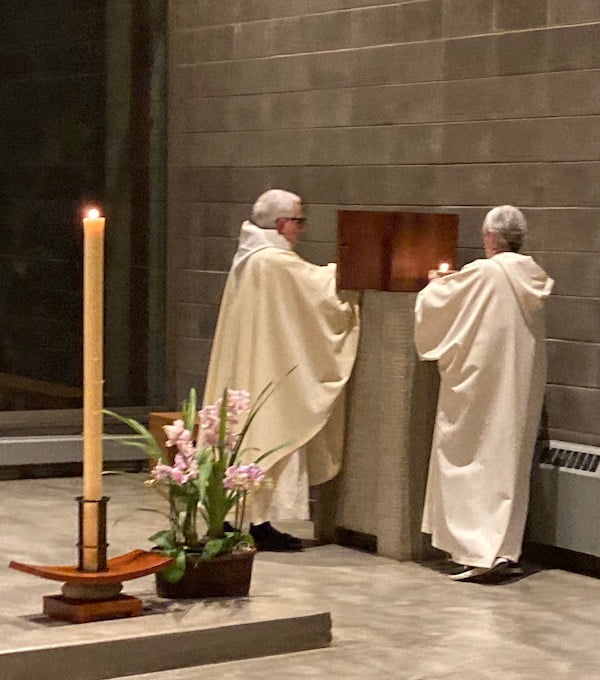“Do this in remembrance of me”: with each Eucharist Jesus’ total self-gift and offering is present, in our midst and within our hearts. ‘Remembrance’ is not only an event of the past; it is an event as well in the present moment of our lives. For us we are not to be passive followers of Jesus. We raise our lives with Jesus at each Eucharist. We re-commit daily to giving our all, no matter the cost, at the service of gospel love, unrequited love, not expecting anything in return, love that is pure in intent, free in that moment, of the ways we become selfish, jealous, comparing myself with others and so on. This gift of Jesus, of his whole self, of unconditional love and forgiveness, lives within us and is the foundation for our self-gift. Over and over, we are to return to this gift of God’s Son given freely to us and for us. “Do this in remembrance of me”: These divine mantric words weave around our lives, inside and out. Outside of the daily Eucharist, we are still to do, to live eucharist, to live our self-gift and offering, the gift of ourselves, our offering of Divine love to one another, to whom ever crosses our path, friend and foe alike.
“This is my Body for you” breathes the Divine voice. Fr. Hans Urs von Balthasar writes: “The inexhaustible fullness of the divine sacrifice of love lies hidden in the terse words of institution…It is as if, after a stone has been lifted away, a never-ending stream flows from a spring” (Light of the Word, p.313). With or without us this never-ending stream of Divine Love flows…we are to receive this living stream of love to nurture us, to sustain us for the work we are to do, interiorly and in our lived lives…We are never finished until our last breath is given freely back to God, a life hopefully lived in the fullness of our self-gift.
To emphasize this, von Balthasar writes: “If Jesus presents us with his eternal offering not merely for reception but also for ‘doing’ (‘do this in my remembrance’, 1 Cor 11:25), is there any limit to the awesome reverence with which we must carry out this ‘doing’ of the ‘eternal redemption’ (p.204). The dailyness of our lives, the dailyness of receiving the Eucharist is made sacred by the gift, the gift of the Eucharist, the gift of Christ’s body and blood. And this gift fully received, sends us out with profound reverence to continue Christ’s work of transformation of evil, of all that stands in opposition to God’s unconditional love and forgiveness, for Divine Love and transformation is stronger than death, stronger than the powers of darkness. Our faith rests on this theological reality. The Eucharist is the ultimate embodiment of the ‘Word made flesh’.
I close with the words of Pope Francis who is stressing that our lives are to be a living eucharist. He says: “It’s impossible to measure the love of God: it is without measure! And so, we become capable of loving even those who do not love us: and this is not easy. To love someone who doesn’t love us…. It’s not easy! Because if we know that a person doesn’t like us, then we also tend to bear ill will. But no! We must love even someone who doesn’t love us! Opposing evil with good, with pardon, with sharing, with welcome. Thanks to Jesus and to his Spirit, even our life becomes “bread broken” for our brothers and sisters. And living like this we discover true joy! The joy of making of oneself a gift, of reciprocating the great gift that we have first received, without merit of our own. This is beautiful: our life is made a gift! This is to imitate Jesus” (Angelus, June 22, 2014).
Sr. Kathy DeVico, Abbess
Chapter Talk – Corpus Christi – June 22, 2025-cycle-C


